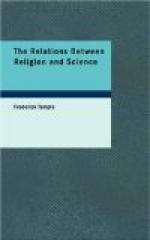LECTURE II.
THE ORIGIN AND NATURE OF RELIGIOUS BELIEF.
The voice within. The objection of the alleged relativity of knowledge. Absolute knowledge of our own personal identity. Failure to show this to be relative; in particular by Mr. Herbert Spencer. The Moral Law. The command to live according to that Law; Duty. The command to believe in the supremacy of that Law; the lower Faith. The Last Judgment. The hope of Immortality. The personification of the Moral Law in Almighty God; the higher Faith. The spiritual faculty the recipient of Revelation, if any be made. The contrast between Religion and Science.
LECTURE II.
THE ORIGIN AND NATURE OF RELIGIOUS BELIEF.
’So God created
man in His own image, in the image of God created
He him.’ Genesis
i. 27.
The order of phenomena is not the highest revelation of God, nor is the voice of Science the only nor the most commanding voice that speaks to us about Him. The belief in Him and in the character which we assign to Him does not spring from any observation of phenomena, but from the declaration made to us through the spiritual faculty.
There is within us a voice which tells of a supreme Law unchanged throughout all space and all time; which speaks with an authority entirely its own; which finds corroboration in the revelations of Science, but which never relies on those revelations as its primary or its ultimate sanction; which is no inference from observations by the senses external or internal, but a direct communication from the spiritual kingdom, the kingdom, as philosophers call it, of things in themselves; which commands belief as a duty, and by necessary consequence ever leaves it possible to disbelieve; and in listening to which we are rightly said to walk not by sight but by faith.
Now, before going on to say anything more about the message thus given to us from the spiritual world, it is necessary to consider an objection that meets us on the threshold of all such doctrines, namely, that it is simply impossible for us to know anything whatever of things in themselves. Our knowledge, it is urged, is necessarily relative to ourselves, whereas absolute as distinct from relative knowledge is for ever beyond our reach. We can speak of




